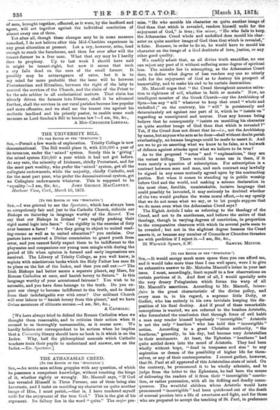THE ATHANASIAN CREED.
[TO THE EDITOR OF THE "SPECTATOR."] SIR,—An acute man seldom grapples with any question, of which he possesses a competent knowledge, without touching the hinge of it, whether rightly or wrongly. Mr. Maccoll says, "If God has revealed Himself in Three Persons, one of them being also Incarnate, and I insist on moulding my character on quite another image of Him, I must perish,—that is, I have rendered myself unfit for the enjoyment of the true God." This is the gist of his argument. Its fallacy lies in the word " quite." The major pre-
miss, " He who moulds his character on quite another image of God than that which is revealed, renders himself unfit for the enjoyment of God," is true ; the minor, "He who fails to keep. the Athanasian Creed whole and undefiled does mould his char- acter on quite another image of God than that which is revealed," is false. Because, in order to do so, he would have to mould his character on the image of a God destitute of love, justice, or any other good quality.
We readily admit that, as all divine truth sanctifies, no one can reject any part of it without suffering some degree of spiritual loss. The mistake lies in attempting, as the Athanasian Creed does, to define what degree of loss renders any one so utterly unfit for the enjoyment of God as to destroy his prospect of immortality, and to make his end to be certain destruction.
Mr. Maccoll urges that " the Creed throughout annexes salva- tion to rightness of will, whether in faith or morals." Now, no intelligent member of the Greek Church—say the Archbishop of Syra—has any " will " whatever to keep that creed " whole and undefiled ;" on the contrary, his "will" is persistently and determinately set against one part of it, which he " insists on " regarding as unscriptural and untrue. Does any human being believe that he consequently "insists on moulding his character on quite another image of God than that which is revealed ?" Yet, if the Creed does not direct that he—i.e., not the Archbishop by name, but anyone who acts as he does—shall without doubt perish everlastingly, no human language could be made to assert it. And are we to go on asserting what we know to be false, as a bulwark of defence against attacks upon what we believe to be true?
As to the proposed " notes " and " explanations," they are the veriest trifling. There would be some use in them, if it were merely a question of subscription. For subscription is a contract between man and man, and such contract may lawfully be signed in any sense mutually agreed upon by the contracting parties. But when it comes to standing up in public worship before God and the world, and making a solemn declaration in the most clear, forcible, unmistakable, incisive language that could possibly be invented, it may seriously be doubted whether of the two would produce the worse moral effect,—to say openly that we do not mean what we say, or to let people suppose that we do mean even what the Athanasian Creed says ?
The Eighth Article I take as referring to the theology of the Creed, and not to its anathemas, and believe the entire of that theology, though in varying degrees of conviction, in proportion to the comparative clearness with which its several parts seem to be revealed ; but not in the slightest degree because the Creed asserts it, or because any number of Councils or. Churches threaten me with perdition if I reject it.—I am, Sir, &c.,






































 Previous page
Previous page